Related Research Articles
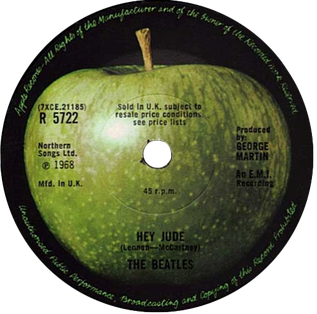
"Hey Jude" is a song by the English rock band the Beatles that was released as a non-album single in August 1968. It was written by Paul McCartney and credited to the Lennon–McCartney partnership. The single was the Beatles' first release on their Apple record label and one of the "First Four" singles by Apple's roster of artists, marking the label's public launch. "Hey Jude" was a number-one hit in many countries around the world and became the year's top-selling single in the UK, the US, Australia and Canada. Its nine-week run at number one on the Billboard Hot 100 tied the all-time record in 1968 for the longest run at the top of the US charts, a record it held for nine years. It has sold approximately eight million copies and is frequently included on music critics' lists of the greatest songs of all time.

The Four Seasons is an American band formed in 1960 in Newark, New Jersey. Since 1970, they have also been known at times as Frankie Valli and the Four Seasons. Known for the use of a traditional Italian-American sound, they are one of the best-selling musical groups of all time, having sold an estimated 100 million records worldwide.
"California Girls" is a song by the American rock band the Beach Boys from their 1965 album Summer Days . Written by Brian Wilson and Mike Love, the lyrics were partly inspired by the band's experiences touring Europe for the first time, detailing an appreciation for women across the world. It was released as a single, backed with "Let Him Run Wild", and reached number 3 on the Billboard Hot 100. It was also a top 10 hit in several other countries, becoming one of the band's most successful songs globally.
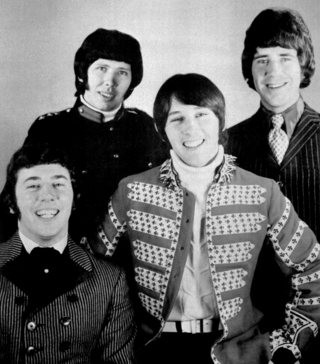
The Tremeloes are an English beat group founded in 1958 in Dagenham, England. They initially found success in the British Invasion era with lead singer Brian Poole, scoring a UK chart-topper in 1963 with "Do You Love Me".

"That Thing You Do" is the titular song appearing in the 1996 film of the same name. Written by Adam Schlesinger, the song is performed by the fictional 1960s band the Wonders, who are the focus of the film. The song peaked at No. 41 on the Billboard Hot 100 and was nominated for an Academy Award and a Golden Globe Award for Best Original Song in 1997.

"You've Got to Hide Your Love Away" is a song by the English rock band the Beatles. It was written and sung by John Lennon and released on the album Help! in August 1965.
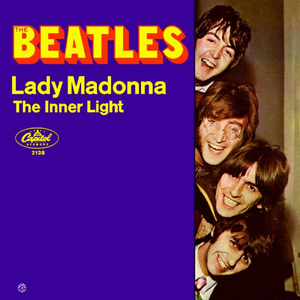
"Lady Madonna" is a song by the English rock band the Beatles, written primarily by Paul McCartney and credited to Lennon–McCartney. In March 1968 it was released as a mono non-album single, backed with "The Inner Light". The song was recorded on 3 and 6 February 1968, before the Beatles left for India, and its boogie-woogie style signalled a more conventional approach to writing and recording for the group following the psychedelic experimentation of the previous two years.
"I Don't Want to Spoil the Party" is a song by the English rock band the Beatles, written by John Lennon and credited to Lennon–McCartney. It was featured as the twelfth track on the 1964 album Beatles for Sale. "I Don't Want to Spoil the Party" was also released on the Beatles for Sale EP. It was later released as the B-side of the US single "Eight Days a Week", and then as the fifth track on the North America-only album Beatles VI. The song reached number 39 on the Billboard Hot 100.

"Please Mr. Postman" is a song written by Georgia Dobbins, William Garrett, Freddie Gorman, Brian Holland and Robert Bateman. It is the debut single by the Marvelettes for the Tamla (Motown) label, notable as the first Motown song to reach the number-one position on the Billboard Hot 100 singles chart. The single achieved this position in late 1961; it hit number one on the R&B chart as well. "Please Mr. Postman" became a number-one hit again in early 1975 when The Carpenters' cover of the song reached the top position of the Billboard Hot 100. "Please Mr. Postman" has been covered several times, including by the British rock group the Beatles in 1963. The 2017 song "Feel It Still" by Portugal. The Man draws on "Please Mr. Postman" and includes a credit for Brian Holland.
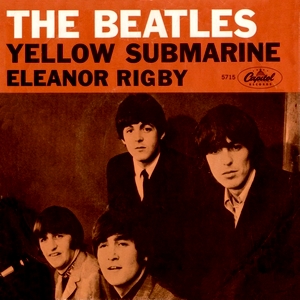
"Yellow Submarine" is a song by the English rock band the Beatles from their 1966 album Revolver. It was also issued on a double A-side single, paired with "Eleanor Rigby". Written as a children's song by Paul McCartney and John Lennon, it was drummer Ringo Starr's vocal spot on the album. The single went to number one on charts in the United Kingdom and several other European countries, and in Australia, Canada and New Zealand. It won an Ivor Novello Award for the highest certified sales of any single written by a British songwriter and issued in the UK in 1966. In the US, the song peaked at number two on the Billboard Hot 100 chart.
Robert Kuban was an American musician and bandleader.
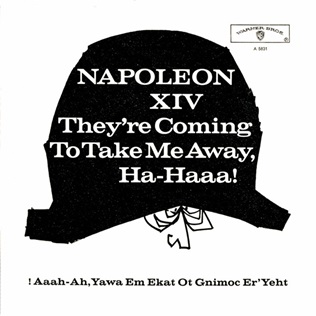
"They're Coming to Take Me Away, Ha-Haaa!" is a 1966 novelty record written and performed by Jerry Samuels, and released on Warner Bros. Records. The song became an instant success in the United States, peaking at No. 3 on the Billboard Hot 100 popular music singles chart on August 13, No. 1 on the Cash Box Top 100 Pop Singles charts, No. 2 in Canada, and No. 4 on the UK Singles Chart.
Walter Simon Notheis, Jr., best remembered by his stage name of Walter Scott, was an American singer who fronted Bob Kuban and The In-Men, a St. Louis, Missouri-based rock 'n' roll band that had brief national popularity during the 1960s.
"If I Were a Carpenter" is a folk song written by Tim Hardin in the 1960s, and re-recorded with commercial success by various artists including Bobby Darin, The Four Tops and Johnny Cash. Hardin's own recording of the piece appeared on his 1967 album Tim Hardin 2. It was one of two songs from that release performed by Hardin at Woodstock in 1969. The song, believed by some to be about male romantic insecurity, is rumored to have been inspired by his love for actress Susan Morss, as well as the construction of Hardin's recording studio.
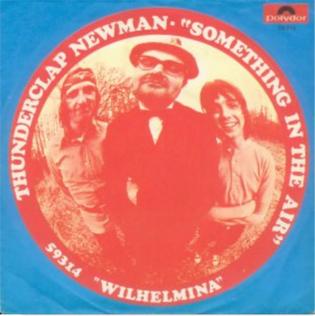
"Something in the Air" is the debut single by British rock band Thunderclap Newman, written by Speedy Keen who also provided lead vocals. It was a No. 1 single for three weeks in the UK Singles Chart in July 1969. The song has been used for films, television and advertisements, and has been covered by several artists. The track was also included on the band's only album release Hollywood Dream, over a year later.
The Wonder Who? was a nom de disque of The Four Seasons for four single records released from 1965 to 1967. It was one of a handful of names used by the group at that time, including Frankie Valli and The Valli Boys. Wonder Who? recordings generally feature the falsetto singing by Valli, but with a softer falsetto than on "typical" Four Seasons recordings.
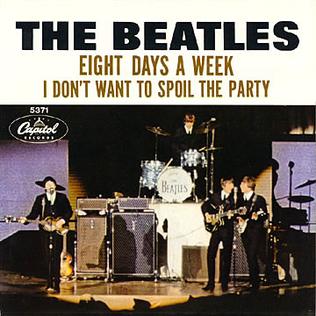
"Eight Days a Week" is a song by the English rock band the Beatles. It was written by Paul McCartney and John Lennon based on McCartney's original idea. It was released in December 1964 on the album Beatles for Sale, except in the United States and Canada, where it was first issued as a single A-side in February 1965 before appearing on the album Beatles VI. The song was the band's seventh number 1 single on the Billboard Hot 100, a run of US chart success achieved in just over a year. The single was also number 1 in Canada, Belgium and the Netherlands.
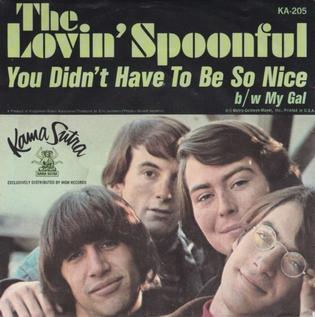
"You Didn't Have to Be So Nice" is a song by the American folk-rock band the Lovin' Spoonful. Written by John Sebastian and Steve Boone, it was issued on a non-album single in November 1965. The song was the Spoonful's second-consecutive single to enter the top ten in the United States, peaking at number ten. It was later included on the band's second album, Daydream, released in March 1966.

"Got to Get You into My Life" is a song by the English rock band the Beatles, first released in 1966 on their album Revolver. It was written by Paul McCartney and credited to Lennon–McCartney. The song is a homage to the Motown Sound, with colourful brass instrumentation and lyrics that suggest a psychedelic experience. "It's actually an ode to pot," McCartney explained.

"You Better Run" is a song by the Young Rascals. Written by group members Eddie Brigati and Felix Cavaliere, it was released as the band's third single in 1966 and reached the top 20 in the United States. This song is noted for its repeated roller coaster musical chords in the bass guitar, going from C to B-flat to C to E-flat to B-flat to C.
References
- ↑ "One Hit Wonders » 60 KUBAN, BOB & THE IN-MEN "THE CHEATER"" . Retrieved 2021-11-27.
- ↑ Anthony, Shane (13 September 2011). "Man who murdered St. Louis singer dies in prison". STLtoday.com. Retrieved 2021-11-27.
- ↑ "The Cheater | Bob Kuban And The In Men | The Hot 100". Billboard. 2013-01-02. Retrieved 2021-11-27.
- ↑ "RPM Top 100 Singles - April 11, 1966" (PDF).
- ↑ "RPM Top 100 Singles - May 23, 1966" (PDF).
- ↑ "Bob Kuban & the In-Men Songs, Albums, Reviews, Bio & More". AllMusic. Retrieved 2021-11-27.
- ↑ "Cash Box Magazine - January 15, 1966" (PDF).
- ↑ Dillon, Dan (June 2005). So, Where'd You Go to High School, Vol. 2. Virginia. ISBN 9781891442339.